|
Panzer I Ausf A
Part One - Construction
by Terry Ashley
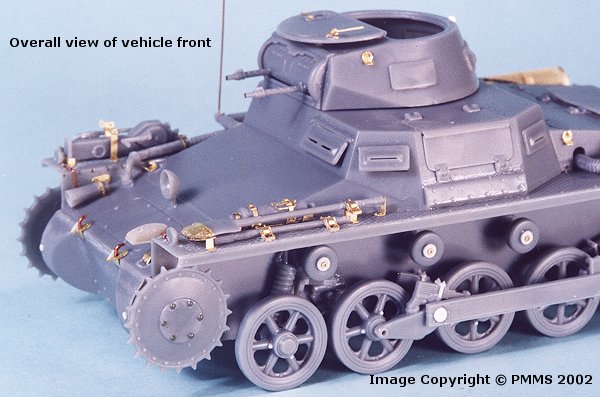 |
|
Panzer I Ausf A |

HyperScale is proudly supported by Squadron.com
Building Tristar's new 1/35 scale Panzer I Ausf A is fairly straightforward
as this is only a small vehicle. If you choose to build it straight from the box
a nice model will result but, as with any kit, there is scope for additional
detailing.
One advantage of working with a basically sound kit is you donít have to
worry about correcting major errors and can concentrate on adding those small
details that enhance the final appearance. This kit falls into that category.
I will generally follow the construction sequence and highlight any problems
along the way. I have added additional details from plastic card, rod and bits
from the ABER Pz.Kpfw.1 detail set (No.35065). It should be noted that this ABER
set is designed for the Italeri/Zvezda Panzer 1 and as the detail on the Tristar
kit is far better than these kits not all the ABER parts are required.
Suspension and Drive Sprockets
The kit parts are nicely detailed and fit together well, by following the
instructions you shouldnít have any problems.
I felt some areas could do with some tweaking and started with the road
wheels, these have the lubrication points included but I added a small plastic
card disc (made with a punch and die set) to make then stand out a little more.

On the main suspension units I cut off the leaf spring securing bolts which
were a little underdone on the kit parts and replaced these with plastic card
and rod with Grant Line bolt heads for better definition and also drilled out
the centre of the axle hubs as these are hollow on most photos Iíve seen.
Click the thumbnails below for
additional views of the suspension construction:
The return rollers hubs have a raised centre section and I added this with
more plastic card discs with an etched Ďboltí centre.
The main bolts on the drive sprockets I also felt were a little small and I
replaced these with larger bolt heads taken from and old Tamiya M3 Lee kit.
These old kits such as the M3 Lee and M3 Stuart which have many bolt heads
included are excellent for cannibalising by cutting of the bolt heads with a
shape blade and using elsewhere by attaching them with a small dab of liquid
cement. One kit can supply you with hundreds of bolt heads of different sizes.
Finally the beam between the two suspension units also should have raised
Ďhubsí where they attach to the units and again these were added using plastic
card discs.
The road wheels are designed to rotate freely, but I glued these in place to
aid in attaching the tracks and also to ensure the added details remained
visible.
Hull Construction
This is fairly straightforward with only a few parts to make the hull proper.
On the lower hull is added the front plate which fitted nicely but take care to
put it the right way up with bolt heads to the bottom, this part will fit either
way so take note. The rear plate fitted without problems and there is also an
internal bulkhead to add. This canít be seen after construction but does give
some rigidity to the lower hull but I donít think it would cause a problem if
left out.
The upper hull is one large moulding but ensure you add the rear intakes
grills (part C13) from the inside of the upper hull before gluing to the lower
hull or you will have some fun fitting the grills.
I glued the main upper hull to the lower hull before added the front glacis
plate (part C19) as this had some minor fit problems. I had to trim small
amounts from both sides and the front to get a good fit between the front plate
and upper hull.
Trim small amounts only and test fit often. Donít trim too much at one time
because itís a bigger problem to add some back if the plate is trimmed too
small.
All the hull hatches and vision ports are separate parts so you can choose to
show these open or closed?
I added a row of six bolt heads along the rear hull sides (behind the
exhausts) as these were missing but would be impossible for Tristar to include
given the constraints of the injection moulding process. These bolts were again
Ďstolení from the old Tamiya Lee kit. They are very small and partially hidden
by the exhausts so may not be noticed on the finished model.
Another six small bolt heads were added inside the front fenders also using
the same method as above but are more noticeable than the rear bolts.
Wiring was added to the small front fender lights from thin wire and the
Notek light was added with a resin light from a Royal Models set on an etched
base made from a bit of left over brass. The Notek light was often fitted to
later vehicles as well as most Afrika Korps vehicles and as I will be finishing
the model in that paint scheme I decided to add this.
The rear exhausts were hollowed out by careful drilling and trimming with a
sharp blade as well as the right front outlet pipe being drilled out and the
aerial was repositioned in the up position with the aerial itself being replaced
with thin wire.
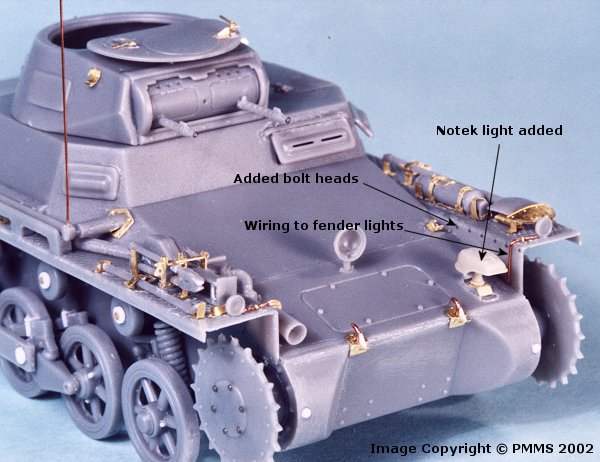
The plate fitted over the rear engine grills was thinned at the edges for
better effect as were the front section of the side fenders as I left off the
front fender extensions (these are rarely seen on operational vehicles).
On the rear hull the towing shackle was thinned down for a more realistic
appearance and an etched chain added (not shown in photos).
This completes the main additions to the hull. All the remaining detailing
was replacing some kit parts with items from the ABER etched set. These included
all the lifting points with the two hull front points being further detailed
with bits a thin card and wire. The front klaxon horn mount was replaced as were
all the tool attachments and latches. These latches are fairly time consuming
but do add to the final appearance, one thing I have noticed with the ABER tool
latches in they appear to be slightly over sized. I have noticed this on other
models Iíve added these bits too but is more noticeable on such a small vehicle
therefore I reduced some of the latches in size to better fit onto the fenders.
The tracks and lens from the large front light were left off until after
painting.
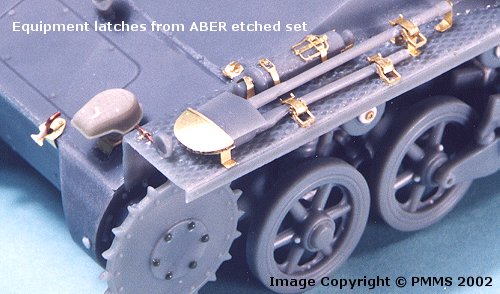
Click the thumbnails below for
additional views of the hull detailing:
The Turret
This again is very simple in construction and went together without any
problems. I drilled out the MG barrels and added the lifting points from the
ABER set as well as the internal latches on the separate main hatch.
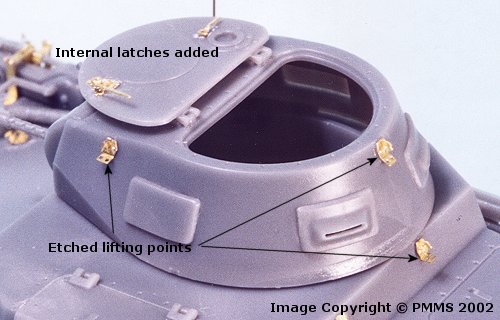
When drilling out barrels I find it helpful to mark the end of the barrel
with a black felt pen, this gives a better key to ensure your drill bit is
centred before drilling, nothing worse than drilling a hole only to find it if
off to one side. (see image above)
The vision ports are again separate so you can position these open if you
wish?
The Tracks
These tracks by ModelKasten are especially made for this kit. They are
sensational. There are left and right handed links so take care to ensure they
are on the correct side when you are assembling the track lengths.
The instructions show to lay the links out on a piece of self adhesive tape
and insert the connecting pins as you go. While this method will work perfectly
well I personally prefer another method for assembling separate track links.
After removing the links from the sprues (and taking care of any cleanup
needed), I assemble a short length of track (say 10 links) by holding the links
between my fingers, clipping the next link in place and inserting the connecting
pin. Apply a small amount of liquid cement to each connecting pin and cut off
once dry. Doing this in short lengths avoids a long length dangling out of your
hand.
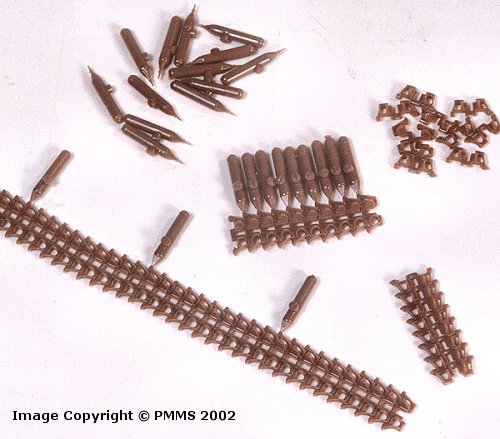
When you have enough short sections for one track, 8 in this case as there
are 88 links per side; you can then join the shorter sections together to form
the one full track length.
As is said this is a personal preference and the tape method plus the use of
a custom made jig will also work, whatever method works best for you is the one
to use.
Click the thumbnails below for
additional views of the track:
In summary, Tristar's 1/35 scale Panzer I Ausf. A was a pleasure to build
with only a few minor areas to watch out for as mentioned above.
The amount of added details is entirely up the individual modeller but it is
an excellent kit whether it is built straight from the box or if it is
superdetailed.
To Be Continued in Part Two -
Painting, Markings and Weathering
In the meantime, for more information go to:
Tristar is distributed in Australia by Modelmania
70 J Dobson Rd
Morayfield
Queensland 4506
Australia
Phone: 07 54286381 (International 61 7 54286381)
Fax: 07 54286382 (International 61 7 54286382)
http://www.modelmania.com.au
e-mail: modelmania@bigpond.com
Model, Images and
Article Copyright © 2002 by Terry Ashley
Page Created 17 September 2002
Last updated 04 June 2007
Back to HyperScale Main Page
Back to Features Page |
Home
| What's New |
Features |
Gallery |
Reviews |
Reference |
Forum |
Search